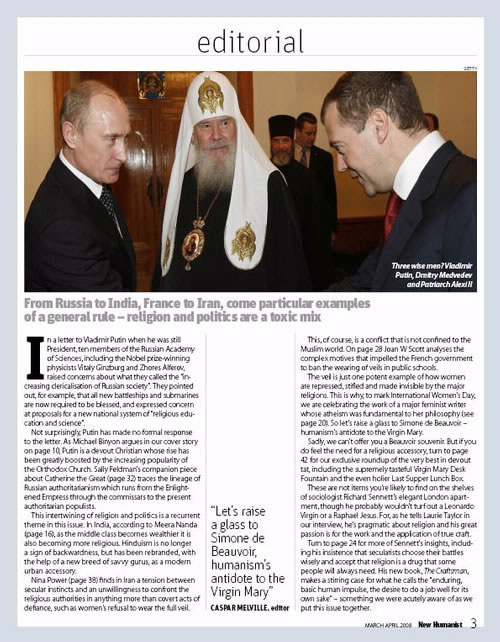 In a letter to Vladimir Putin when he was still President, ten members of the Russian Academy of Sciences, including the Nobel prize-winning physicists Vitaly Ginzburg and Zhores Alferov, raised concerns about what they called the “increasing clericalisation of Russian society”. They pointed out, for example, that all new battleships and submarines are now required to be blessed, and expressed concern at proposals for a new national system of “religious education and science”.
In a letter to Vladimir Putin when he was still President, ten members of the Russian Academy of Sciences, including the Nobel prize-winning physicists Vitaly Ginzburg and Zhores Alferov, raised concerns about what they called the “increasing clericalisation of Russian society”. They pointed out, for example, that all new battleships and submarines are now required to be blessed, and expressed concern at proposals for a new national system of “religious education and science”.
Not surprisingly, Putin has made no formal response to the letter. As Michael Binyon argues in our cover story, Putin is a devout Christian whose rise has been greatly boosted by the increasing popularity of the Orthodox Church. Sally Feldman’s companion piece about Catherine the Great traces the lineage of Russian authoritarianism which runs from the Enlightened Empress through the commissars to the present authoritarian populists.
This intertwining of religion and politics is a recurrent theme in this issue. In India, according to Meera Nanda, as the middle class becomes wealthier it is also becoming more religious. Hinduism is no longer a sign of backwardness, but has been rebranded, with the help of a new breed of savvy gurus, as a modern urban accessory.
Nina Power finds in Iran a tension between secular instincts and an unwillingness to confront the religious authorities in anything more than covert acts of defiance, such as women’s refusal to wear the full veil.
This, of course, is a conflict that is not confined to the Muslim world. Joan W Scott analyses the complex motives that impelled the French government to ban the wearing of veils in public schools.
The veil is just one potent example of how women are repressed, stifled and made invisible by the major religions. This is why, to mark International Women’s Day, we are celebrating the work of a major feminist writer whose atheism was fundamental to her philosophy. So let’s raise a glass to Simone de Beauvoir – humanism’s antidote to the Virgin Mary.
Sadly, we can’t offer you a Beauvoir souvenir. But if you do feel the need for a religious accessory, get hold of a print copy of this issue to see exclusive roundup of the very best in devout tat, including the supremely tasteful Virgin Mary Desk Fountain and the even holier Last Supper Lunch Box.
These are not items you’re likely to find on the shelves of sociologist Richard Sennett’s elegant London apartment, though he probably wouldn’t turf out a Leonardo Virgin or a Raphael Jesus. For, as he tells Laurie Taylor in our interview, he’s pragmatic about religion and his great passion is for the work and the application of true craft.
Read the interview for more of Sennett’s insights, including his insistence that secularists choose their battles wisely and accept that religion is a drug that some people will always need. His new book, The Craftsman, makes a stirring case for what he calls the “enduring, basic human impulse, the desire to do a job well for its own sake” – something we were acutely aware of as we put this issue together.

